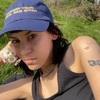On the surface, not much has changed since I was 17. I still live in the same area – that cluster of postcodes that make up the Hackney borough in east London. I have a similar style – bar the American Apparel bodycon dress, straight cigs and side fringe. Even my personality has remained largely unchanged – although I am more self-aware, maybe, less impulsive. I drink less, go home earlier. I am more patient with people. Other than that, it’s like the past nine years were a fever dream. Is this what growing up feels like, I wonder? Like, nothing at all?
Advertisement
Peer a little closer, though, and the changes are clear to see. Being 17 is such a specific moment in time. You are an adult-child, poised for the future, and yet completely unprepared for it. You are self-conscious, aware of your own body, but also suddenly awake to the power you hold, and how to use it. You genuinely think you will be 17 forever. You have no idea about the heartbreak and contradictions and life lessons that will shake up your future. And because of that, you are fearless with yourself and with others – or at least I was.Earlier this month, on Friday 18 January, Brooklyn-based musician Sharon Van Etten released her fifth album, Remind Me Tomorrow. It’s brilliant, full of atmospheric songwriting and emotionally affecting melodies. But there’s one song that really stands out. In “Seventeen”, the lead single, she sings: “I used to be free / I used to be 17” her words breaking over soaring guitar riffs. Later, her voice lowers over the bass and synth: “I see you so uncomfortably alone / I wish I could show you how much you’ve grown.” And in those two contradictory bars, Van Etten articulates exactly what it means to be 17. How sweet it can be, how uncomfortable, how complex it feels to look back on.Van Etten isn’t the first artist to pay homage to this specific age. One of my favourite songs under this theme is The Crystals’ “What a Nice Way to Turn 17” which was released in 1962. This is a blissful, romantic song, in which they sing about spending their birthday in the arms of someone they love. Whenever I hear it, though, it reminds me of the blind idealism of that age. How crushes can feel mammoth and unconditional, how little you feel the need to protect yourself because you’ve likely not been hurt yet – at least not properly. “Don’t let me go, ‘cos I love, oh I love you so,” Dolores Kenniebrew sings, her voice glimmering and soft like treacle, “What a nice way to turn 17… I’m 17.”
Advertisement
Once you notice pop music’s love affair with this specific age, suddenly you see it everywhere. It’s there “by the record machine” when Joan Jett sings about how she “knew he must have been about 17.” It’s there in Abba’s “Dancing Queen” who was “young and sweet” and “only 17.” Stevie Nicks’ most famous solo song “Edge of Seventeen” is all about a young boy, right on the cusp of that difficult, sparkling time. It’s there, too, in Eurythmics actually quite awful 1999 release “17 Again,” in which Annie Lennox looks back on being 17, sings about how it feels: “Innocence will teach you, what it feels like to be used / Thought that you'd done everything, you didn't have a clue.” I could carry on listing a bunch of songs like this, but honestly who has time. Seventeen is everywhere. It’s the age we can’t seem to let go of.Obviously you could say it’s not necessarily the age 17 that pop music is obsessed with, but being a teenager in general. Much has already been written about pop culture’s never-ending infatuation with youth, and there are plenty of songs, films and books which are based around being 16, or 18. But there is also a specific energy to being 17. When you’re 16, you’re still at school, you’re treated like a child because you are one. When you’re 18, you’re basically an adult – in the UK at least. You’ve probably moved out. You’re growing up. But 17 is different. 17 is a strange, shimmering anomaly, suspended in the air. When artists write about that age, what they’re really writing about is time, and the spaces between it all.Sharon Van Etten’s “Seventeen” is joyful and painful to listen to. For me, it conjures up this weird feeling of nostalgia and sadness for what’s lost, for how swiftly the years flick by like pages, for the way our relationships with ourselves and others change. But it also makes me feel relieved for exactly the same reasons.I’m so happy I’m not 17. Aren’t you? Immense pressures have been lifted. I can do exactly what I want, when I want (if I have the funds). Life takes on a different pace, and you start understanding patterns, which you can lean into as you age. When Ladytron sang “They only want you when you’re 17 / When you’re 21, you’re no fun” on their 2002 hit “Seventeen” they might have been right. What they don’t tell you, of course, is that you won’t care, and that’s the most fun thing of all.You can follow Daisy on Twitter.
